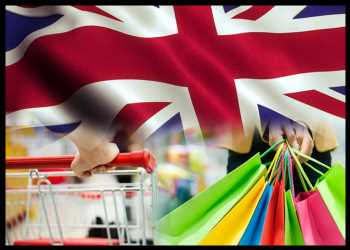UK consumer price inflation slowed slightly in August from a 40-year high on a fall in fuel prices, figures from the Office for National Statistics showed Wednesday.
Consumer price inflation unexpectedly slowed to 9.9 percent in August from 10.1 percent in July. The rate was forecast to rise slightly to 10.2 percent.
On a monthly basis, the consumer price index rose 0.5 percent, slightly weaker than the 0.6 percent rise in July. Economists had expected prices to climb again by 0.6 percent.
Meanwhile, core inflation that excludes energy, food, alcoholic beverages and tobacco rose to 6.3 percent in August, in line with expectations, from 6.2 percent in the previous month.
A fall in the price of motor fuels made the largest downward contribution to annual inflation, while rising food prices made the largest upward pressure.
Despite the slowdown, overall inflation is forecast to stay around 11 percent into early next year before falling back more dramatically, ING economist James Smith said.
The Bank of England is watching wage growth more closely, as the hawks worry that worker shortages could lead to core inflation staying more persistently above target, the economist added.
At the August-rate setting meeting, the BoE had lifted its key rate by half-a-percentage point to the highest since December 2008. The bank had expected inflation to peak just over 13 percent in the fourth quarter of this year.
Another report from the ONS showed that factory gate inflation logged its first percentage point fall in the annual rate since May 2020, largely due to a fall in petroleum product prices.
Factory gate inflation eased to 16.1 percent from 17.1 percent in the prior month, while the rate was forecast to advance to 17.4 percent.
Likewise, input price inflation slowed to 20.5 percent from 22.6 percent in July. The rate was below economists’ forecast of 22.4 percent.
Month-on-month, output prices unexpectedly edged down 0.1 percent, reversing July’s 1.6 percent increase. The rate was forecast to gain 0.9 percent. This was the first time the monthly rate has been negative since September 2020, the ONS said.
Similarly, input prices dropped 1.2 percent on month after staying flat in July. Economists had forecast prices to rise 0.3 percent. Prices have dropped for the first time since August 2020.
Source: Read Full Article
-
Natural Grocers Organic Amaranth Grain Recalled
-
Mobile Download Speeds May Surpass…
-
French Industrial Production Rebounds In November
-
Disney World Closing Some Attractions & Universal Orlando Cutting Early Entry As Hurricane Idalia Closes In On Florida
-
RBI may go for another 35 bps rate hike before pause

